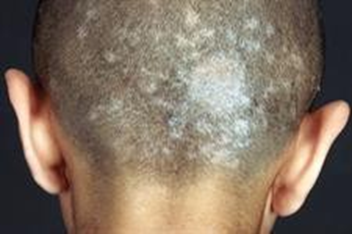A school nurse is assessing a school-age child and notices white flakes that don't brush off the hair and a rash on the back of the child's neck. The nurse should suspect which of the following disorders?
Pediculosis capitis
Impetigo contagiosa
Folliculitis
Tinea capitis
The Correct Answer is D
A. Pediculosis capitis, commonly known as head lice, is characterized by the presence of live lice and nits (lice eggs) attached to the hair shaft close to the scalp. They do not typically cause a rash on the back of the neck.
B. Impetigo is a bacterial skin infection characterized by red sores or blisters that rupture and form honey-colored crusts. It commonly affects areas of the body with broken skin, such as the face, hands, and arms.
C. Folliculitis is inflammation or infection of the hair follicles caused by bacteria or fungi. It can result in red, swollen, and pus-filled bumps around hair follicles.
D. Tinea capitis is a fungal infection of the scalp and hair follicles. It is characterized by the presence of white or grayish flakes that adhere to the hair shafts and cannot be easily brushed off, along with a rash or scaly patch on the scalp. The rash may extend to the back of the neck.

Nursing Test Bank
Naxlex Comprehensive Predictor Exams
Related Questions
Correct Answer is A
Explanation
Temper tantrums are a normal part of development in toddlers and often occur when they are frustrated or unable to express their needs effectively. Understanding that tantrums are the child's way of asserting independence and coping with overwhelming emotions can help parents respond to them more effectively.
B, C, and D are not accurate statements about temper tantrums. Leaving the room during a tantrum may not be safe or appropriate, getting a psychological consult is usually not necessary for typical temper tantrums, and temper tantrums are not indicative of a learning disability.
Correct Answer is B
Explanation
A. A fall of a bike into the handlebars is unlikely to be directly associated with glomerulonephritis. Trauma from a fall could potentially cause hematuria, but it is not a common cause of glomerulonephritis.
B. Streptococcal throat infection 2 weeks ago is commonly associated factor with post-streptococcal glomerulonephritis (PSGN). PSGN can occur after an infection of the throat or skin by certain strains of streptococcal bacteria.
C. Nausea and vomiting for the last 24 hours can be present in a child with glomerulonephritis but are not specific to glomerulonephritis.
D. Urticaria and itching are not typically associated with glomerulonephritis. They can be symptoms of allergic reactions or other conditions, but they are not indicative of glomerulonephritis on their own.
Whether you are a student looking to ace your exams or a practicing nurse seeking to enhance your expertise , our nursing education contents will empower you with the confidence and competence to make a difference in the lives of patients and become a respected leader in the healthcare field.
Visit Naxlex, invest in your future and unlock endless possibilities with our unparalleled nursing education contents today
Report Wrong Answer on the Current Question
Do you disagree with the answer? If yes, what is your expected answer? Explain.
Kindly be descriptive with the issue you are facing.
